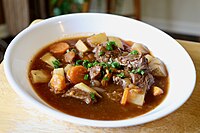
Photo from wikipedia
Reduction in portion size, particularly for energy-dense foods, is increasingly addressed in healthy eating guidelines in a bid to tackle the obesity epidemic. The effect of portion size on other… Click to show full abstract
Reduction in portion size, particularly for energy-dense foods, is increasingly addressed in healthy eating guidelines in a bid to tackle the obesity epidemic. The effect of portion size on other aspects of dietary quality, such as nutrient intakes, is less studied. The aim of the current work was to investigate associations between food portion sizes and key indicators of dietary quality, namely energy-adjusted intakes of saturated fat, dietary fibre, sodium, calcium, iron, folate and vitamin D, and dietary energy density (DED), in Irish adults on the days the foods were consumed. Data from the Irish National Adult Nutrition Survey (2008–2010) (n = 1274, 18–64 years, 4-day semi-weighed record) were used for the analysis. DED was lower on the days larger portions of boiled potatoes, fruit, vegetables and baked beans were consumed, and higher on the days larger portions of white bread, ready-to-eat breakfast cereals (RTEBCs), frying meats, cheese, butter, biscuits, chocolate and sugar-sweetened beverages were consumed. Micronutrient intakes were higher on the days larger portions of brown bread, RTEBCs, vegetables and low-fat spreads were consumed, and lower on the days larger portions of white bread, butter, biscuits, chocolate, sugar-sweetened beverages and beer/cider were consumed, with the exception of folate. The study identifies foods for which larger portion sizes may be associated with positive dietary attributes, as well as the opposite. It provides an important evidence base from which more specific dietary guidance on food portion sizes might be developed for Irish adults.
Journal Title: Nutrients
Year Published: 2018
Link to full text (if available)
Share on Social Media: Sign Up to like & get
recommendations!